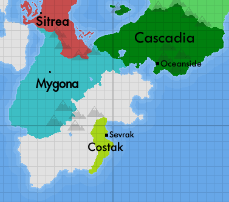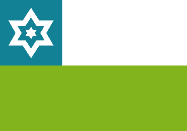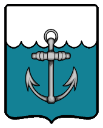Costak: Difference between revisions
No edit summary |
No edit summary |
||
| Line 20: | Line 20: | ||
|other_symbol_type = <!--Use if a further symbol exists, e.g. hymn--> | |other_symbol_type = <!--Use if a further symbol exists, e.g. hymn--> | ||
|other_symbol = | |other_symbol = | ||
|image_map = | |image_map = [[File:LocationCountry.png]] <!--e.g. LocationCountry.svg--> | ||
|loctext = <!--text description of location of country--> | |loctext = <!--text description of location of country--> | ||
|alt_map = <!--alt text for map--> | |alt_map = <!--alt text for map--> | ||
| Line 31: | Line 31: | ||
|capital = Sevrak <!--Name of country/territory's capital, wikilinked if link exists--> | |capital = Sevrak <!--Name of country/territory's capital, wikilinked if link exists--> | ||
|coordinates = <!-- Coordinates for capital, using {{tl|coord}} --> | |coordinates = <!-- Coordinates for capital, using {{tl|coord}} --> | ||
|largest_city = | |largest_city = capital <!--Name of country/territory's largest city. Use "capital" (without quotation marks) if it's the capital.--> | ||
|largest_settlement_type = <!--Type of settlement if largest settlement not a city--> | |largest_settlement_type = <!--Type of settlement if largest settlement not a city--> | ||
|largest_settlement = <!--Name of largest settlement--> | |largest_settlement = <!--Name of largest settlement--> | ||
| Line 38: | Line 38: | ||
|regional_languages = <!--Languages recognised or associated with particular regions within the country/territory--> | |regional_languages = <!--Languages recognised or associated with particular regions within the country/territory--> | ||
|languages_type = <!--Use to specify a further type of language, if not official, national or regional--> | |languages_type = <!--Use to specify a further type of language, if not official, national or regional--> | ||
|languages = | |languages = Costakian, Common, Morrawian, German <!--Languages of the further type--> | ||
|languages_sub = <!--Is this further type of language a sub-item of the previous non-sub type? ("yes" or "no")--> | |languages_sub = <!--Is this further type of language a sub-item of the previous non-sub type? ("yes" or "no")--> | ||
|languages2_type = <!--Another further type of language--> | |languages2_type = <!--Another further type of language--> | ||
| Line 49: | Line 49: | ||
|religion_year = <!--Year of religion data (if provided)--> | |religion_year = <!--Year of religion data (if provided)--> | ||
|religion_ref = <!--(for any ref/s to associate with religion data)--> | |religion_ref = <!--(for any ref/s to associate with religion data)--> | ||
|demonym = | |demonym = Costakian | ||
|government_type = Social Democratic Theocracy | |government_type = Social Democratic Theocracy | ||
|leader_title1 = Saint <!--(for a country, usually the head of state's (wikilinked) title, e.g. "President", "Monarch")--> | |leader_title1 = Saint <!--(for a country, usually the head of state's (wikilinked) title, e.g. "President", "Monarch")--> | ||
Revision as of 23:16, 3 November 2023
Costakan Sovern State Costak | |
|---|---|
 | |
| Capital and | Sevrak |
| Other languages | Costakian, Common, Morrawian, German |
| Religion | Novo Christianity/Novoism |
| Demonym(s) | Costakian |
| Government | Social Democratic Theocracy |
• Saint | Zoya |
• Chancellor | Boris |
| Area | |
• | 76,864 km2 (29,677 sq mi) |
| Population | |
• Estimate | 5.426 million |
• Density | 70.6/km2 (182.9/sq mi) |
| GDP (PPP) | estimate |
• Total | 213 bllion |
• Per capita | 39,368 |
| Time zone | UTC+5 |
Costak, officially the Costakan Sovern States, is a country located in the far South West of Olivacia, a major portion of its population is centered around the capital of Sevrek with a substantial amount also being found in the Svyaz agricultural lands. The nation borders the Kaldaz which also plays a major role in the nation's history, culture and economy. Among the nations five states live a population of 6.243 million people.
Etymology
The name Costak comes from a combination of words from the Slavic language of Costakian. It combines the word for coast, that being "cost" alongside the word "parak" which means port. The reason for the nation, in essence, being called "port coast" is due to its orgins as a union between costal cities in the region before it was expanded to the Northern mountains.
Language
While common and a few other languages are also spoken across Costak due to immigration, Costakian remains the most spoken in the region. Costakian is a primarily Slavic language, with Costak's first settlers being those who sailed from Slavic lands in the West. There is however also influence from other languages such as common due to Costak's more local neighbors.
History
Pre 1000 AC
Costak's history before roughly 1000 AC remains largely a mystery, it is presumed that a native people inhabited the area in small numbers before this date, however it is also believed that these people were wiped out by foreign diseases with the arrival of the Western Slavs.
1000 to 1649 (The era of the free Kingdom of Costak)
Slavic people from the South West of Thrismari, explorers, traveled across the Kaldaz ocean and reached the South West of Olivacia. These people lived off the land for a while before reaching the modern day Sevrek and Svyaz regions which were optimal for settling in small populations thanks to their temperate weather, fertile soil, and seaside position allowing for fishing. The region also remained fairly defendable thanks to the Northern mountains.
1671 to 1845 (The era of the Morrawian Kingdom of Costak)
As the colonial era began, the at the time king of Costak, Vadim Ivanov realized that the minor nation with its small industry, population, and military, would be unable to fully resist an invasion from a colonial power. With this realization, the king looked to Morrawia for aid and made an agreement in 1671. The royal family of Costak would become puppet rulers loyal to Morrawian interest, and in exchange, Costak would keep a level of autonomy and gain protection from other colonial powers. While Costak enjoyed a greater level of autonomy than other colonies at the time, they would still be required by the royal family to allow free immigration and settling from Morrawia, docking rights in ports, as well as much, much lower prices when trading resources to Morrawia. Primarily due to the economic parts of this agreement, Costak's economy would begin to struggle during this period, with a large portion Costakians being fairly poor though still able to afford cost of living. Rural regions such as those in the Svyaz regions were hit particularly hard by the economic hardship, meanwhile some cities like Suyug did even see some minor economic growth in the period thanks to Morrawian settlers.
1846 to 1857 (First independence)
During a time of instability in Morrawia, Costak would quickly begin to attempt to take the opportunity to gain liberties that had been desired for much of the nation's colonial history. This was aided by new ideas in religion, with reformed Christianity known as Novo Christianity or Novoism quickly rising in popularity in the country due to its more relaxed and inclusive polices that ensured less power in the church and king while also promising more rights for groups such as women due to the belief that within the Bible, God had become far more loving and merciful with the arrival of Jesus Christ. This combined demand for both new religious ideas, increased religious freedom, and more liberties alongside Morrawian instability led to a combination of violent and non-violent protests which would eventually lead to the drafting of a constitution and the king being forced from power. The new constitution required that the king instead be elected and be called a chancellor, ruling alongside a democratically elected religious leader known as a saint who would manage religious matters. While the constitution put many restrictions on these leaders, they still had few other people in power to restrict their power. While many were very happy with the new liberties gained, Costak still struggled during this period. While democratically elected, lack of restrictions on the two government leaders raised concerns and increased instability in the newly freed nation. Additionally, the nation struggled economically without Morrawian aid, despite independence, still keeping many rurral citizens poor due to lack of centralization and transportation in the inner regions.
Geography
Environment
Administrative divisions
There are five semi-autnomous states within Costak, from North to south, these are Goralya, Greater Sevrak, North Svyaz, South Svyaz, and
Demographics
TBA
Economy
TBA
Economy
TBA

